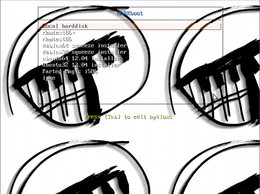HARKboot: Difference between revisions
Jump to navigation
Jump to search
No edit summary |
No edit summary |
||
| Line 1: | Line 1: | ||
{{Project | {{Project | ||
|Name=HARKboot | |||
|ProjectSkills=Programming | |ProjectSkills=Programming | ||
|ProjectStatus=Active | |ProjectStatus=Active | ||
Revision as of 20:56, 21 August 2014
| HARKboot | |
|---|---|
| Participants | Dennis |
| Skills | |
| Status | |
| Niche | |
| Purpose | |
| Tool | |
| Location | |
| Cost | |
| Tool category | |
HARKboot.png {{#if:{{{Tool}}} | [[Tool Owner::{{{ProjectParticipants}}} | }} {{#if:{{{Tool}}} | [[Tool Cost::{{{Cost}}} | }}
Summary
TFTPd (tftpd-hpa) is running and default a pxelinux based menu is served. At this point it is possible to:
- Run memtest
- Run debian and ubuntu installers
- Run partedmagic, a nice diskrescue oriented live linux desktop
Config
- Dhcpd (on NURDServices points to TFTPd (also on NURDServices) (using next-server option)
- Files are served from /tftpboot on NURDServices
Using HARKboot
- Connect your x86 PC/laptop using UTP (wifi won't work)
- Make sure "boot from LAN" is selected in your computer's BIOS
- Boot up your machine
You should end up with something like this:
Todo
- DOS image
- Netbootstuff on the internet
- Use iPXE or gPXE instead of pxelinux in order to make conditional stuff (serve sparc stuff for sun, etc)
